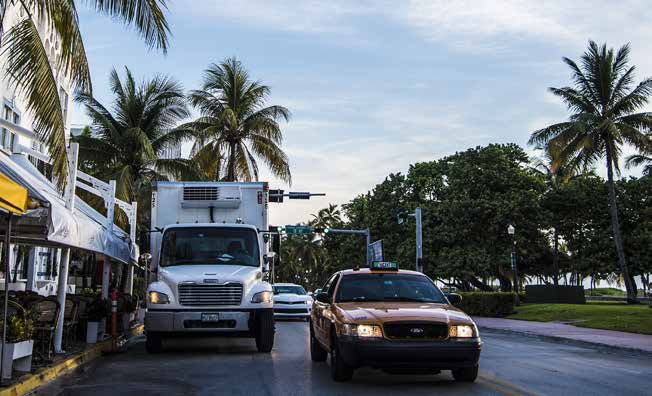Primer for Improved Urban Freight Mobility and Delivery
|
||
Key Accomplishments
|
The City of Miami Beach implemented a loading zone permitting system in response to issues with double parking, a major contributor to traffic congestion, as well as noise from freight loading activities that was disrupting residents and hotel guests at night. In May 2014, the Mayor and City Commission approved an ordinance establishing new freight loading regulations, which took effect in August 2014.
The City's goal is to facilitate loading activities for carriers and businesses alike. The rules state that vehicles using new and expanded freight loading zones (FLZ) or alley loading (AL) areas require an "FLZ" or "AL" permit, respectively. The vehicle license plate serves as the vehicle's electronic permit, and parking enforcement officers use license-plate recognition readers to confirm validity. Permittees also receive an online account to manage their fleet permits and make revisions to vehicle assignments in real time.
An FLZ is a posted on-street parking area, typically 60 to 100 feet long, for the use of commercial vehicles with a gross vehicle weight exceeding 10,000 lbs. Posted signs provide permitted hours, days, time limits, payment options, and prohibitions. Alleys are city rights-of-way providing "backdoor" access to commercial establishments or residential properties for loading and unloading. An AL permit is granted to vehicles with a gross weight of less than 10,000 lbs., and is intended for the use of smaller vehicles servicing commercial establishments. This approach to loading zone management uses the existing curbside and alley areas to more efficiently facilitate carrier access to the City's commercial and residential properties.
Commercial vehicles exceeding a gross vehicle weight of 10,000 lbs. must attain either a semi-annual or annual permit. Infrequent users do not need to attain a permit and may pay for parking at a pay station or via ParkMobile, a mobile app. The 31 existing loading areas were expanded to 35 FLZs with a total of 3,500 curbside linear feet, an increase of 182 percent.

Traffic moves past a delivery truck in Miami Beach. Source: Pixabay.com.
This equates to 8,200+ freight loading time slots (either 30 or 60 minutes) in the district, assuming an average of two vehicles per freight loading zone during all permitted freight loading hours, six days a week. Delivery hours vary, but are typically from 7 a.m. to 1 p.m. to avoid peak travel times for visitors to the beach or commercial shopping district. FLZ locations, days, and hours are monitored and adjusted accordingly to promote efficient use of curbside parking spaces.
The Mayor and Commission, City Manager's Office, City Attorney's Office, Parking Department, Public Works Department, Transportation Department, Code Enforcement Department, Fire Department, and Police Department endorsed the program to help address traffic congestion. The City also held over 50 meetings with businesses and carriers to discuss concerns and issues surrounding enforcement. As a result of information gathered from these meetings, the City was able to come up with an effective enforcement approach to ensure compliance. In addition to citations for and towing of non-compliant vehicles, drivers obstructing traffic (double parking) can be issued moving violations (which affect a driver's record) and businesses that accept deliveries outside FLZ hours can be issued city code citations. This holds both the vehicle operator and the business receiving the freight accountable for vehicle violations. Establishing penalties for both carriers and receivers was an essential part of the program's success.
Saul Frances, Parking Director, City of Miami Beach, (305) 673-7505 x6200, SaulFrances@miamibeachfl.gov
|
United States Department of Transportation - Federal Highway Administration |
||